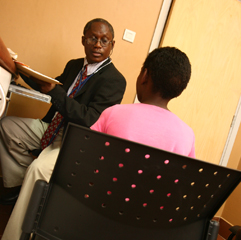 Ensuring that HIV information is securely stored and
Ensuring that HIV information is securely stored and
confidentiality maintained will avoid potential
stigmatization and discrimination of individuals and
communities. Photo credit: UNAIDS/A.GutmanIn middle-and lower-income countries there is a push to improve patient management and the monitoring and evaluation of HIV services. To do this, all information systems, either paper-based or electronic, need to allow for relatively easy access to information. To ensure that patient confidentially is not compromised in the process, new guidelines have been released.
The ‘Interim Guidelines on Protecting the Confidentiality and Security of HIV Information’ offer information on data transfer, guiding principles, even disposal of information all to help maintain patient confidentiality.
Developed through a special workshop supported by UNAIDS and the United States President’s Emergency Plan for AIDS Relief (PEPFAR), international health professionals and people living with HIV reviewed existing materials that could then be adapted to middle- and lower-income countries.
“Good clinical information is required for optimum treatment and care for people living with HIV.” said Eddy Beck, Senior Technical Officer, UNAIDS Evaluation Department. “Ensuring this information is securely stored and confidentiality maintained will avoid potential stigmatization and discrimination of individuals and communities, and enhance the quality of the information collected,” he added.
The new guidelines provide definitions, guiding principles and technical recommendations for the maintenance of privacy, confidentiality and security in working with HIV-related information.
The main recommendations from the guidelines:
 Using health data for public health goals must be
Using health data for public health goals must be
balanced against individuals’ rights to privacy and
confidentiality. Photo credit: UNAIDS/A.Gutman - Using health data for public health goals must be balanced against individuals’ rights to privacy and confidentiality;
- Health data need to serve the improvement of health and reduction of harm for all people. Policies, procedures, and technical methods must be balanced to protect both;
- individual and public rights must be balanced, and should be based on human rights principles;
- Within countries, privacy and confidentiality laws should be developed and put in place; relevant parameters of privacy or confidentiality laws must be reviewed and known by all persons accessing health data;
- The development and review of laws and procedures related to HIV information needs active participation from relevant stakeholders, including people living with and affected by HIV, health care professionals, and legal and ethical experts;
- Funding organizations should comply with these guidelines and make funding available to implement them. Maintaining security and confidentiality must be a condition for funding.
These interim guidelines will be field tested and additional training materials will be developed.
Links:
Download the ‘Interim Guidelines on Protecting the Confidentiality and Security of HIV Information’ 




